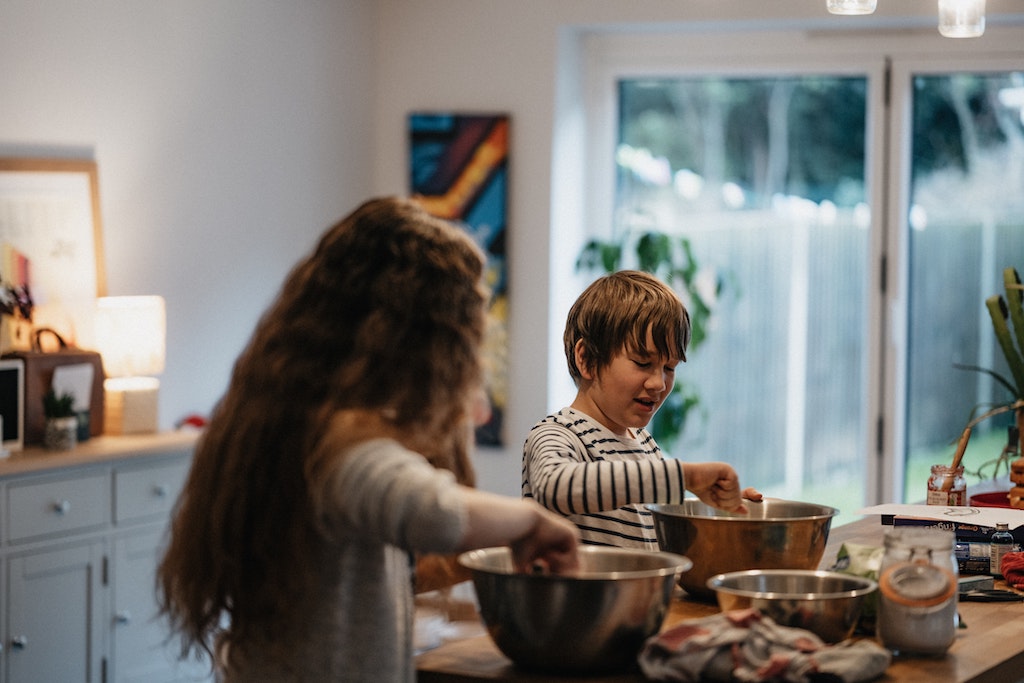
As parents, we want our children to be happy and confident. We hope they will grow into the sort of adults we would like to know: able to look after themselves, social and successful in at least one role. Knowing how to prepare one’s own meals is a fundamental aspect of being an adult. Beyond just opening packets, the ability to select fresh food and combine it in a tasty and appealing way is a true life-skill.
It makes sense to introduce this skill to children early in their lives. The ability to prepare nutritious and sustaining food is an especially precious possession. And now, even more so, knowing that plant-based diets are thought to provide ‘primordial prevention’ against the serious chronic diseases of our time, puts the potential for good health firmly in the cook’s hands.
Even very young children can participate in the preparation of family meals. It’s a chance to connect with real food ingredients and to recognize qualities that will help children make healthy and compassionate choices, later. They will develop skills and talents to use throughout life. Everyone appreciates a good meal…and the cook who made it!
In fact, children usually love being in the kitchen. Cooking is creative and fun. Eating is social and delicious. It’s all good news!
Most of us parents have to ‘re-wire’ our attitudes and habits, though. Because cooking beside kids is a party! Yes, there are safety issues. Sure, a few hygiene practices need explaining. But when else in your life are you going to see your five-year-old kneading bread dough; your tweenie inventing sandwiches that include mashed potato; your teen using the wooden spoons to practice a drum riff on your mixing bowl—at the same time as whipping up a stunning lentil soup?
Kids in the kitchen offers a chance to put the joy back into meal making. Don that funny apron you were ‘too cool’ to wear a year ago. Serve the dessert first for an ‘upside-down’ dinner. Breakfast can be candle-lit; ambient music can be heavy metal.
If you are worried about safety, the mess, or a shortage of time, take a moment to consider the options: banning children from the kitchen will keep them in unskilled ignorance until young adulthood or beyond. Share meal prep with them now, and they are likely to gain skills, grow in confidence and probably delight you with wonderful conversation and photo opportunities.
If you say ‘Yes!’ to kids in the kitchen, here are simple tips to help you get started:
Safety: Give your child a qualification! The role of Safety Officer gives them the power to correct you if you break one of the Safety Rules. You’ll have to agree on the Rules; but the young officer learns to value and pay attention to details of safety, which they are then unlikely ever to forget.
Mess: Have plenty of floor cloths and hand towels at the ready and make sure everyone knows which is which. Offer aprons. Sweep up before you trip up. Do the washing up while you sing or play word games. Most of all, relax. This is a phase that won’t last forever.
Time: Yes, it does take more time; but it’s an investment in your child. You can schedule long sessions for the weekend; on other days, share simple tasks that suit their age. Try not to watch the clock; a non-pressured atmosphere is best.
3-6-year-olds: Water play comes into its own! Stand them at the sink and let them scrub vegetables, wash berries, or measure liquids. On dry land, let them try kneading and stirring.
7-10-year-olds: Children of this age are natural experimenters. Let them make a spice mixture, concoct a new spread, or design a smoothie. When they are ready, encourage them to write a recipe!
11-13-year-olds: The age of expertise. Theirs might be the difference between black, pink and white peppers, but it still denotes enthusiasm! Putting safety first, let them learn the same kitchen skills you have. Sharp knives, blenders, hotplates and open flame are facts of life and, with your unobtrusive guidance, these young people can deal with them very well.
14-16-year-olds: At this age, they can ‘take over’ or successfully deal with your phone call asking ‘Please, can you make dinner tonight?’ But, they still need to feel looked after, so don’t make that call too often!
16 plus: Going solo is just around the corner. Encourage them to develop a wide repertoire of dishes to set them up, for good!
You: Become assistant to your child: help only when necessary, preferably only when asked. Enjoy!